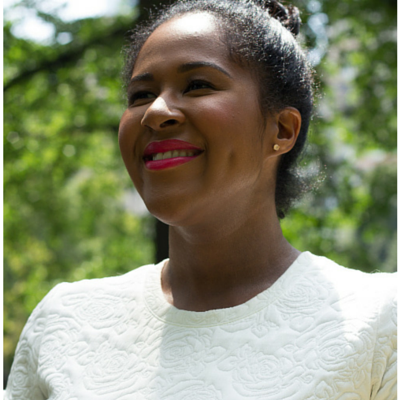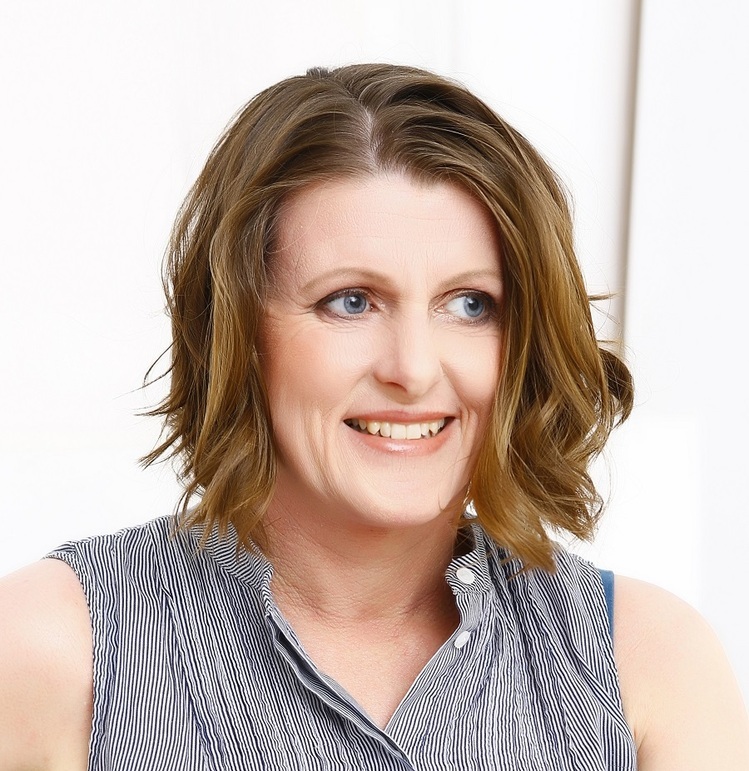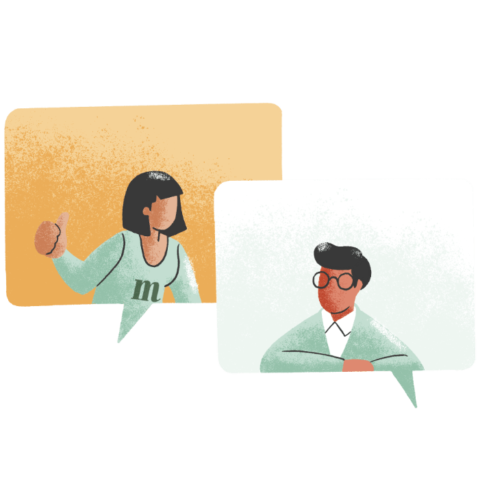Atopic eczema is one of the most prevalent skin conditions globally, affecting over 230 million people worldwide. There is a tendency to dismiss it as "just a skin condition," which means patients' needs are not always met in a timely and supportive manner.
Also known as atopic dermatitis (AD), the condition affects mental health and daily life in a variety of ways and places a heavy burden on patients and caregivers alike.
During World Eczema Day, September 14th, we held a LinkedIn Live discussion with Ashley Wall and Ruth Holroyd, two of our AD patient experts, to raise awareness of the impact and burden of this condition.
In this post, we share some highlights from our highly informative and engaging chat. You can view the full video replay of the discussion on our YouTube channel.
Our first question, given the two terms used to describe the condition, was whether there was a difference between atopic eczema and atopic dermatitis.
Ashley clarified that she would categorize the two terms differently. She explained that atopic dermatitis is a lifelong eczema condition that affects people with moderate to severe eczema. Dermatitis comes in different forms, such as contact dermatitis. You can get dermatitis on your scalp or on your hands. In contrast, atopic dermatitis affects your entire body. “So I pretty much consider eczema like a hub,” she said. “ And then there's different branches. So atopic dermatitis is one hub of eczema. That's how I look at it.”
We then discussed how frustrating it is to have atopic dermatitis dismissed as ‘just a skin condition’.
“It is really frustrating because it's affected me since childhood,” said Ruth. “I grew up with a lot of shame and guilt because I was always being told off for scratching and told off for getting blood on my clothes. So I just internalized all that. I felt like it was my fault.”
In describing the burden of living with the condition, Ruth explained how “it affects your sleep and your mental health. It affects how attractive you feel to other people. People comment on it. So as a woman, that's really hard. I always had it worse on my face. It affects every single part of my life, just from being able to wash the dishes and make the bed. Sometimes when your skin splits, when you try and do things, it's life-limiting. And sometimes for some of us, we don't grow out of it. So it's not just an itch.”
Ruth's comments resonated with Ashley, who noted that when she was younger the Internet wasn't the source of information it is today. “Since we didn't see any representation it compounded the shame and isolation,” she said. “But now I've joined communities. I do Zoom calls with eczema communities or experts. If I am having a breakout, I will contact somebody in the community and talk about it. I'll also do research on certain websites or social media. The internet has really changed the game completely. It has brought so much access, something that we didn't have before, which was so unfortunate.”
Ashley Wall“I just love the online community with atopic dermatitis because people are so helpful. Everybody wants to help, everybody gives opinions. So it's really great.”
Ruth and Ashley both commented on how fast you can get answers online when it's hard to get an appointment with a doctor. Ruth mentioned a recent study looking at the huge rise in eczema conversations on social media. “I think perhaps that is because we don't feel heard and we don't always feel like we get to have the advice we want from the medical professionals,” she explained.
Ruth cautioned however, that going online is not without its downsides. “I've made so many friends and learned so much, but you have to be careful what you take from there,” she said. “And sometimes it can be quite triggering as well for me. Sometimes I have to come right off it because my whole life revolves around it and it can be quite triggering to see people struggling and people with bad skin and then people offering what I might not think is sensible advice. It can be quite difficult to kind of step back and not get upset by it.”
Another downside, according to Ashley, is information overload. “The amount of information about certain skin conditions is overwhelming,” she said. “And everybody wants to be seen. Everybody wants to be heard. The issue with that is there are not enough people to actually sort out what's fact or fiction. What might work for some might not work for others.”
As a counterbalance, Ashley believes more skin specialists should be online so that evidence-based answers can be provided. She suggested, “if somebody puts out something and it may not be true, doctors can do a split screen reaction video and say, ‘I see what you're saying, but here is some factual information about what you put out and why what you put out may not actually be true. And here's the research to back it up."
The more research-based information patients have, the better able they will be to advocate for themselves and the treatment they want to try next, which is something Ruth is passionate about. “I really feel strongly about being an advocate for your position, for your condition,” she explained,” because if there is a treatment out there that you really want and you can find out about it, then you can go and ask your practitioner for it.”
“It's very frustrating for people who are really struggling with their skin because it's hard in a 20-minute consultation, even for the doctor or dermatologist to really get an idea of what you're going through,” said Ruth. “It's so hard to get the best out of those appointments. And so I come armed with all the information and pictures of my skin and what is the hardest thing for me.”
Ruth advises that the best way to prepare for a consultation is to have a clear objective in mind. “It's too difficult to do everything at once,” she explained, “so having an objective helps. I want this one thing to be spoken about and we'll try and tackle it this way, because, with eczema, it's not like, oh, here, I found the answer. This is what will help. It's a million things. And you try things that don't work and you eventually find the detective work helps you find the way to navigate the condition on your own. You have to become an expert because the GP, if that's who you are seeing, is a general practitioner. He isn't going to know probably as much as the patient in many cases.”
How to get the most out of your dermatology appointment
The USA, where Ashley lives, has another barrier to good health care in that treatment is determined by a patient's insurance coverage. “Do you have insurance? What kind of insurance? Do they take your insurance? They take your insurance, but the medication won't be covered or maybe part of it will be covered. It is such a draining process that you're going to start to find people kind of trying to solve it with the home products even before they even get to the doctor.”
Ashley told us a story about hearing a doctor complain about how people come into them when their skin is at its worst. They don't come in when it's just beginning or in the middle. She told the doctor, that one of the reasons for this “is because there are so many different barriers and layers. And they're trying to do whatever they can. You know, they're in pain. They're in agony. So they want a quick fix. And if you can't see the doctor within a couple of weeks, months, maybe even up to a year, that's very frustrating for a patient.” Ashley believes that to address this issue, patients need better access to treatment options, regardless of their economic status.
Describing her frustration at the system, Ashley explained that often “doctors are double booked and you feel like they listen to keywords of what you say. And based on that, they'll go off on a diagnosis and they will write your prescription and then you’ll be on your way. And, you want more, you want to learn how to manage it, not just how to temporarily treat it.There's a whole system that needs to be worked on for patients.”
“It's very intimidating as well,” she continued. “You're sitting on a cold chair and they're above you on a higher chair or standing with the chart, not really making eye contact. I've had very dismissive doctors. You can tell they're busy. It's almost like you feel like you're a burden when they come in and they're so stressed and exhausted. You don't want to feel like that. You want to feel like, hey, you're in the right place. Let's work on it. Tell me what's going on. You know, patients are in agony for the most part. And so anything that makes them feel like a burden will already just make the whole experience worse and have people avoid it if they can.”
Ashley and Ruth had both worked together on a client project around the patient journey of people living with Atopic Dermatitis, highlighting their unmet needs and helping to shape strategic decisions and informing campaigns and content creation to engage people living with the condition.
“You have to make the process comfortable for participants,” recommended Ashley. “They're spending their time doing this not only to help themselves but really to advocate for others because there's a lot of people that have this condition that don't have a voice. And what we are trying to do is help them come out of that. They don't have to be an advocate themselves, but they should advocate for themselves at least. And that's so important. You want the process to be smooth sailing and change from the way it has been, and it can change.”
Adding to Ashley’s comments, Ruth recalled something she pointed out during the course of the project. “I have never been asked by anyone, how do you feel? And I think that's the bit that gets missed,” she said. “And we spent a long time talking about the mental health aspects of living with chronic skin conditions during that project, just to help them understand the sheer magnitude of that. I think they were focusing more on the symptoms. And that brings the whole complexity to decision making and whether people will enroll and stick with a trial.”
As we wrapped up our discussion, we speculated about what could be in store for the the treatment of severe skin conditions in the future.
Ashley is intrigued by emerging discussions on the role of environmental pollutants in the rise of skin conditions, such as eczema. Additionally, she believes research needs to reflect the growing diversity of multi-ethnic groups that are underrepresented, yet continually growing. “There are so many different cultures and ethnicities, but we want to make sure that we're covering them as well,” she advised. “So mixed races and ethnicities, people that are having eczema younger, but also people that are having eczema older.”
Responding to a question about using digital applications to track her skin condition, Ruth told us that neither she, nor others in her dermatitis community, do so suggesting the reason for this is because they don’t want to “focus so much on what is bad.”
“These trackers are all asking you to put in what's bad, how itchy were you? Where were you itchy, what were you eating? It becomes so obsessive,” explained Ruth. “One thing I've learned is letting go of what is happening and accepting that I have a skin condition and not being so obsessive has been a game changer for me. I became so obsessed, it actually made me worse. And when I let go and stop being like that, mentally it's better and my skin seems to improve when I'm less obsessed.”
Ashley sees more value in apps designed for caregivers. “I think it'll help people that actually don't have the condition,” she said. Agreeing with Ruth about the downside of obsessively tracking symptoms, she asked “who wants to be reminded of their condition every single day? You become obsessive. Is it getting better? Is it not getting better? I don't think that is going to help people mentally seeing how they're tracking their eczema. After a while, the mental toll that it will take not seeing yourself progress or get better could kind of do more damage than good.”
Based on her comparison, people with severe eczema use skin apps like weight loss apps. “Once you've lost the weight, you don't really need to track every single thing anymore. Similarly, once eczema becomes moderate to mild, I don't think people are going to use it and it becomes redundant.”
Ruth also spoke about dermatologists' use of digital apps. She described having to stand in her underwear while her dermatologist used an app to check her skin. “And this app requires him to be so quick and most of the time it times him out and he hasn't finished and he has to start again. And he's so embarrassed because I'm standing there in my underwear and he's awkward about that. But he needs the app to give him a score of how my skin is doing. If someone's got really good skin, it might be quick. But if someone has quite a lot of eczema, it would be better if it wasn’t timed.”
In Ashley's opinion, a wearable device would be more effective. “A wearable that can assess your skin when it's doing well and when it's not doing well,” she suggested. “I think that would be so much more helpful for people with eczema.”
At the end of each of our live discussions, we ask our speakers to share a closing thought. Ruth began by sharing her five-second rule. “When my skin was at its worst, people felt they had a right to ask me what was going on all the time. And I think what I would like to teach people is that there is a five-second rule. If you're looking at someone and you're interested to find out why - and I understand most people have a genuine interest and they care - but if you can't change it in five seconds, then just don't mention it.”
“It takes so much effort for me to go out when my skin is like that,” added Ruth. “And that was one of the things that made it so hard to live with because I did not want to be talking about it. I had probably not been out for weeks and I became a complete hermit. So I would want everyone to learn the five-second rule and it applies to everything. If someone's got really bad skin, whether that's acne, or a burn, whether they have a cleft lip, whether they have any condition that makes them look different to you, you have no right to that medical diagnosis. And sometimes we will want to talk about it, but most of the time we won't.”
For Ashley, her message focused on being an advocate for others. “I think it's so important that people understand that the reason why we're doing this is so that they themselves can find their inner strength. I don't think a lot of people understand how powerful they are despite what they're going through.”
“And I hope that they can connect with other people in the community,” she continued, “and other people outside of the community. It is wonderful when you connect to people that have the same condition or that don't have your condition but have something else. And you get to learn about what's going on in their realm and they can learn about what's going on in your realm. It's just so powerful. I've learned so much just talking to people and connecting to people. Just recognize your own strength and know that there are advocates out there and we want the future to be better. We're excited. You know, we're trying to hopefully pave the way for an awesome future for nobody to have to struggle in the way that all of us have previously.
Ashley Wall is a writer, consultant, and eczema patient advocate who’s battled this skin condition for three decades. As an eczema warrior, she’s had the pleasure of speaking on stage in front of a pharmaceutical crowd of 300 industry leaders, interviewing celebrities such as BAFTA award winner Peter Moffat, and attending leading events through her advocacy work. She’s extremely passionate about helping suffering patients and hopes to see eczema disappear within her lifetime. Her blog is Itchin Since '87 Itchin Since '87.
Ruth Holroyd is an author, blogger and patient advocate. She writes about allergies, anaphylaxis, asthma, eczema and topical steroid withdrawal on her award winning blog www.whatallergy.com. She won the Free From Food Awards Hero Award 2021 and has written two books. ‘Anaphylaxis: The Essential Guide: An Action Plan For Living With Life-Threatening Allergies’ which focuses on anxiety and fear and how to live with the daily challenge of living with a life-limiting condition. Her second book, The Shape of Skin, is a poetry book for people with eczema, psoriasis, and sensitive skin.



✕